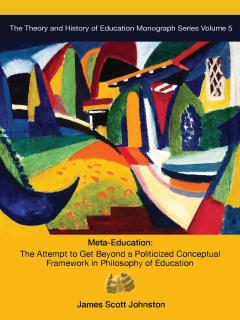Meta-Education: The Attempt to Get Beyond a Politicized Conceptual Framework in Philosophy of Education
Keywords:
Ideology, Schools, Schooling, Philosophy of EducationSynopsis
What does it mean to do philosophy of education? Historically, it has meant to provide philosophical tools for educational issues and problems. These tools include, at a minimum, logic, and argumentative strategies, ‘ways of knowing,’ ‘ways of theorizing,’ and philosophical accounts of various leading thinkers in philosophy and closely allied disciplines. The body of knowledge built up in these encounters with educational theory and practice serve as the ‘content’ of philosophy of education; the body is then driven toward the amelioration or resolution of new and ongoing problems in educational theory and practice.
At the basis of this way of thinking about the role and scope of philosophy of education lies a presumption: philosophy of education, whatever else it is, has its role and function in providing (philosophical) solutions for educational concerns. These concerns are very often political, particularly so in the case of schools and schooling. Education is of course, controversial at its roots; many parties beyond parents and children compete for scare resources as well as control of educational leadership and legislation. Politics is the means by which these differences of opinion (sometimes, acute antagonisms) play out. Here, we have the spectacle of philosophy of education in service to education, broadly considered, with the aim and role of philosophy of education to help ameliorate or solve, manifestly political problems of education.
Philosophy of education generally operates by 1) questioning various presumptions certain thinkers or viewpoints take in making their claims 2) bringing to bear philosophical armament against purportedly anti-democratic standpoints 3) Challenging, through philosophical tools, political or ethical orthodoxies 4) making claims for an adjusted socio-political reality. (These are not exhaustive.) This operation is driven by politics as the end towards which philosophy of education proceeds. And this is the operation this book seeks to criticize. Instead of a philosophy of education driven to political ends, this book provides a different end—an end that is solely developed and followed by philosophy of education, and in no case from outside or beyond. Philosophy of education is to be self-determining and self-determined. The converse of this is philosophy of education susceptible of ideology.
Ideology, then, is the culprit, here. And ideology infects philosophy of education to the degree that almost all the leading schools of thought within are pushed towards a presupposed political end. The way forward is to abandon ideology for self-determination; abandon making the end of philosophy of education equivalent to a political end that educational theory and practice commands. The strategy consists in 1) isolating and identifying ideology and where and how it is practiced in philosophy of education 2) developing a model or framework that is resistant to such ideology 3) Discuss the mechanics and dynamics of this model—its concepts and meta-concepts, in this case 4) Bring this framework or model to bear on the discipline of philosophy of education by suggesting what is and what is not the proper way to go forward if ideology is to be avoided. In the three chapters that make up this book, there is consideration of each and all these sub-strategies.
Chapters
-
Introduction
-
Chapter One: Meta-Education as a Constellation of Meta-Concepts and Concepts
-
Chapter Two: The Origins and Ends of Philosophy of Education (And How These Matter)
-
Chapter Three: The Presuppositions of Logic and Metaphysics in Philosophy of Education
-
Epilogue

Downloads
Published
Categories
License

This work is licensed under a Creative Commons Attribution-NonCommercial 4.0 International License.

